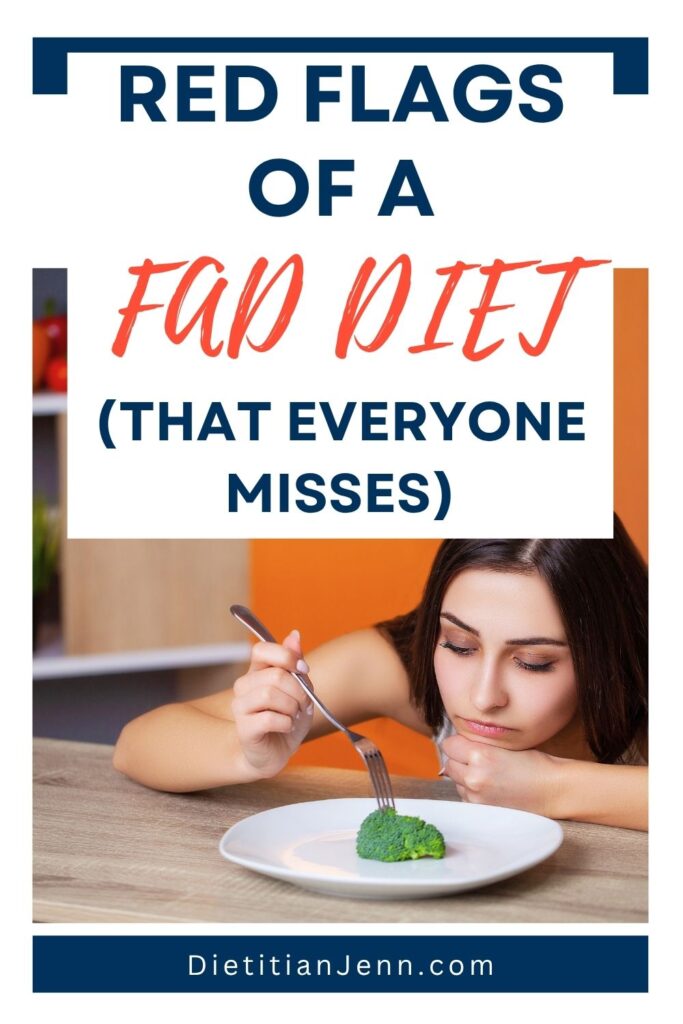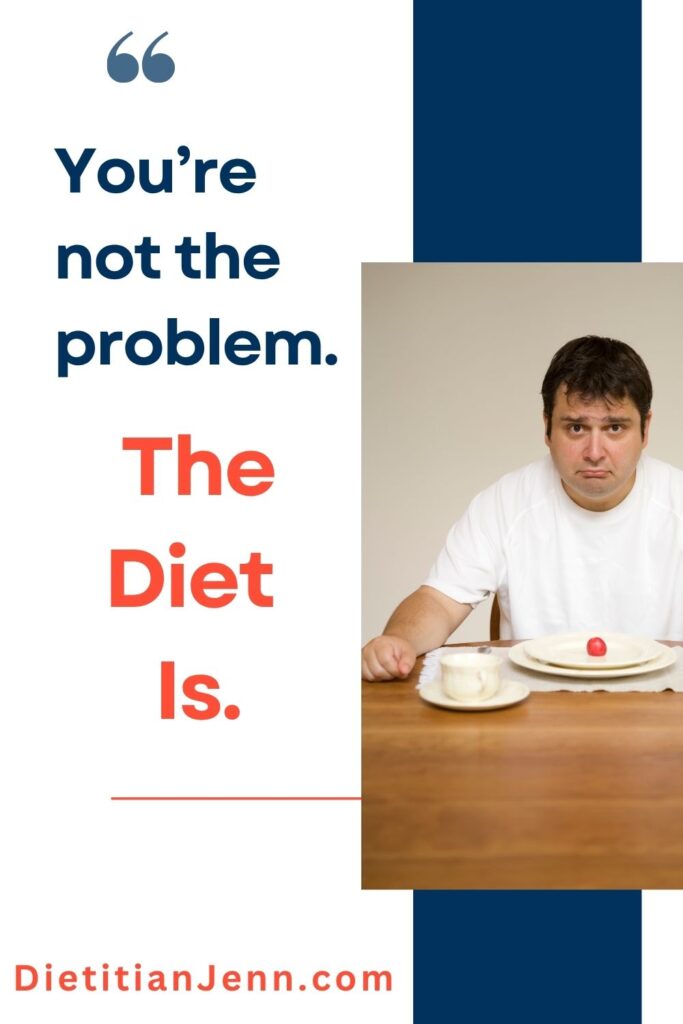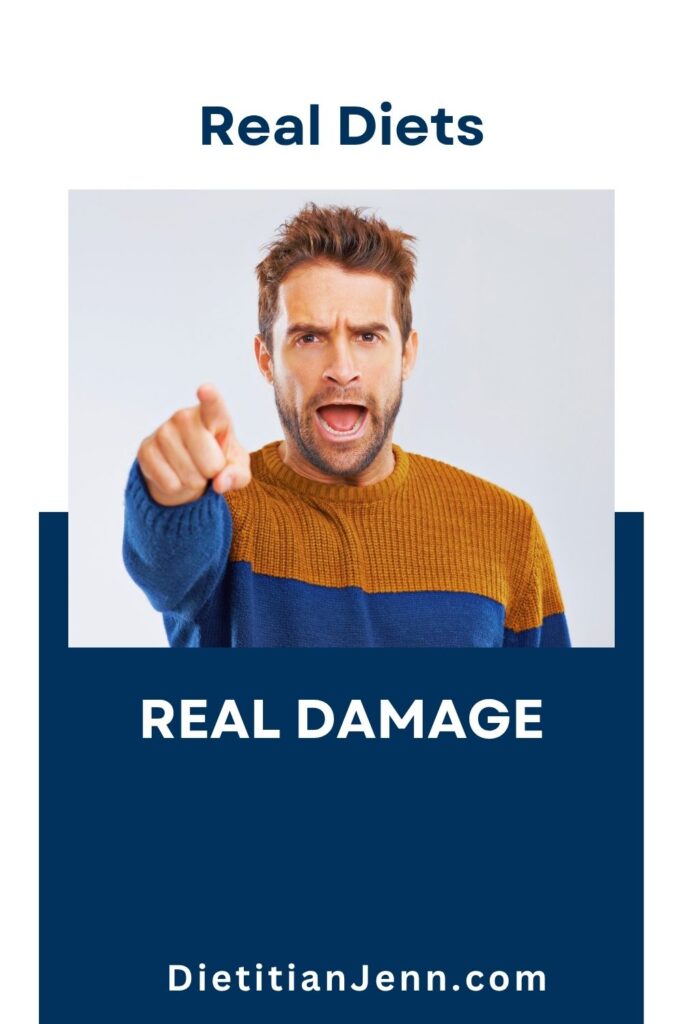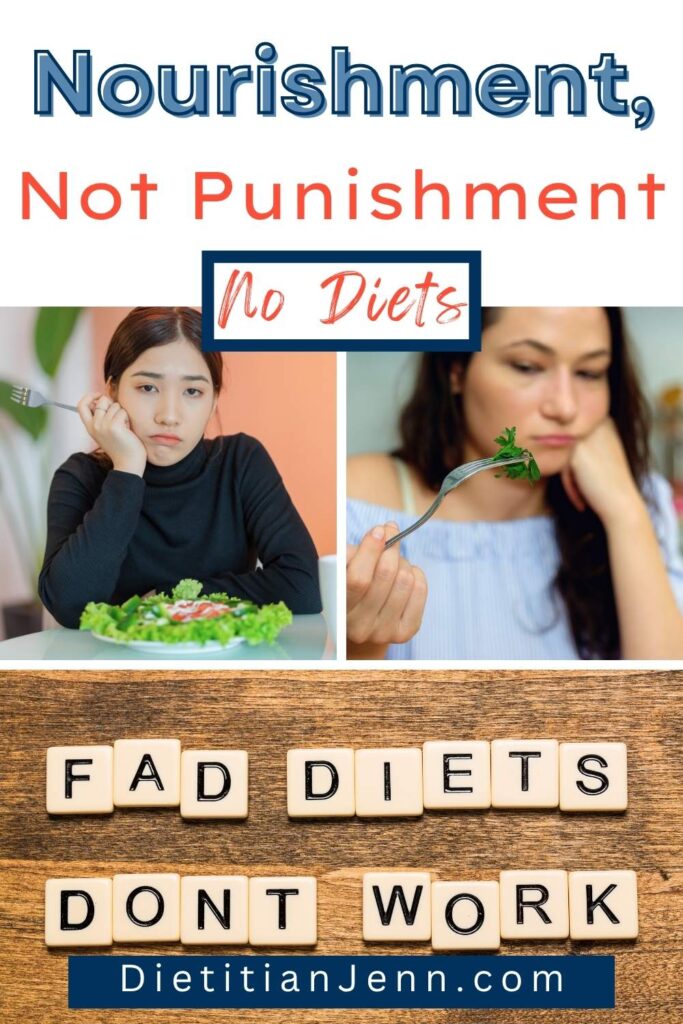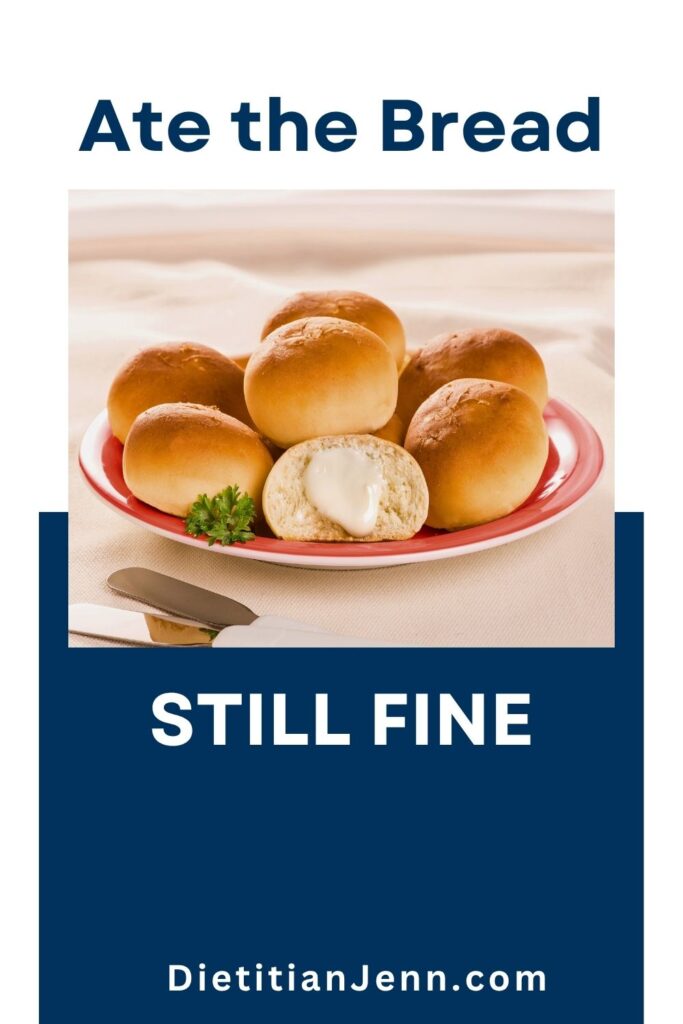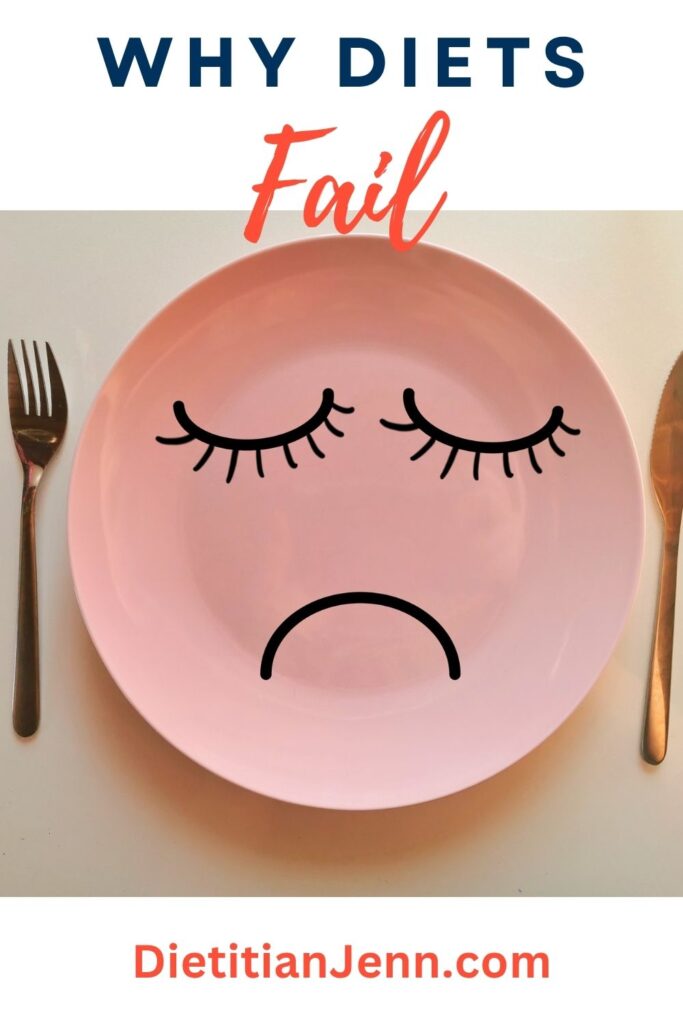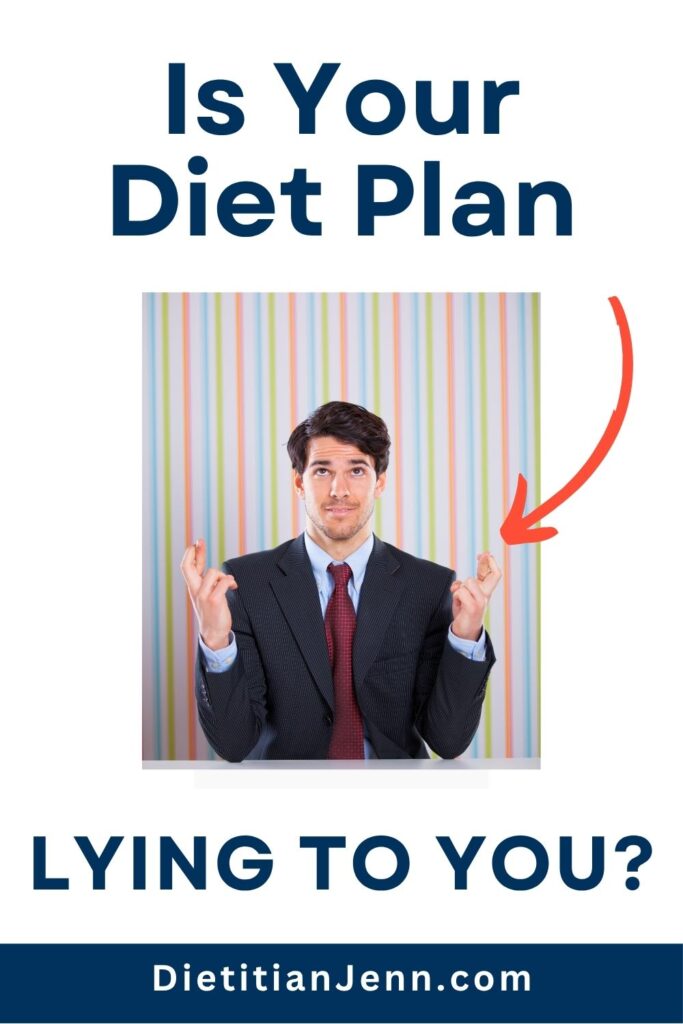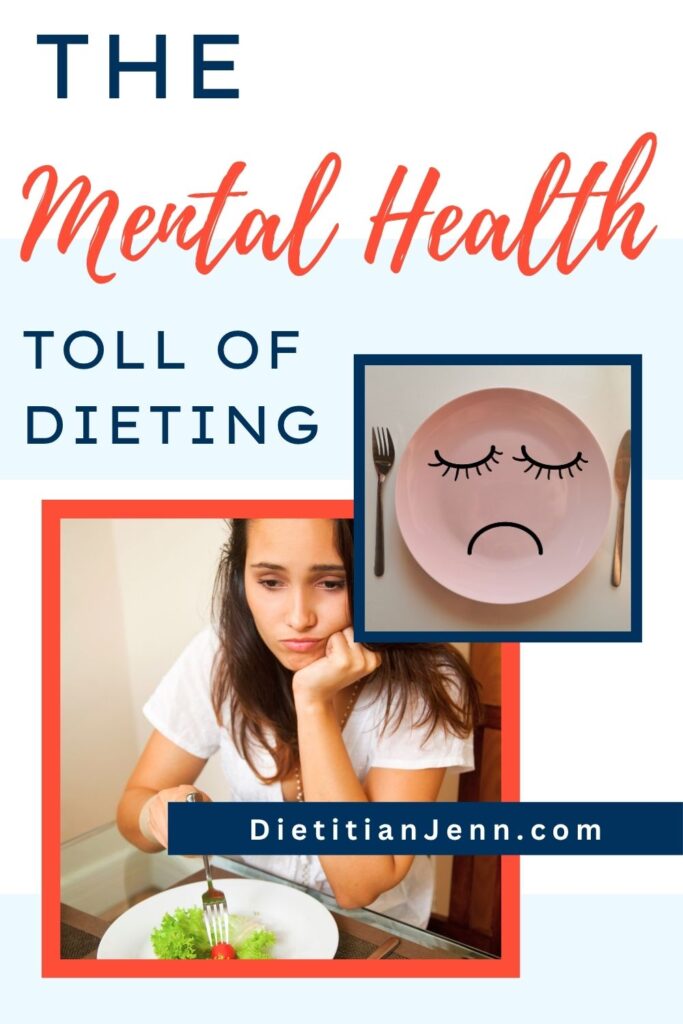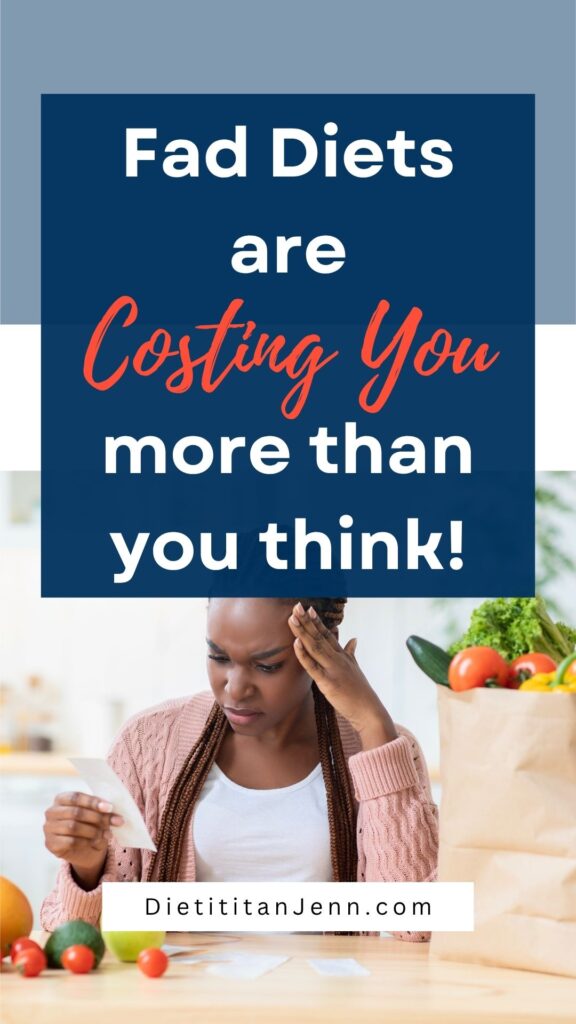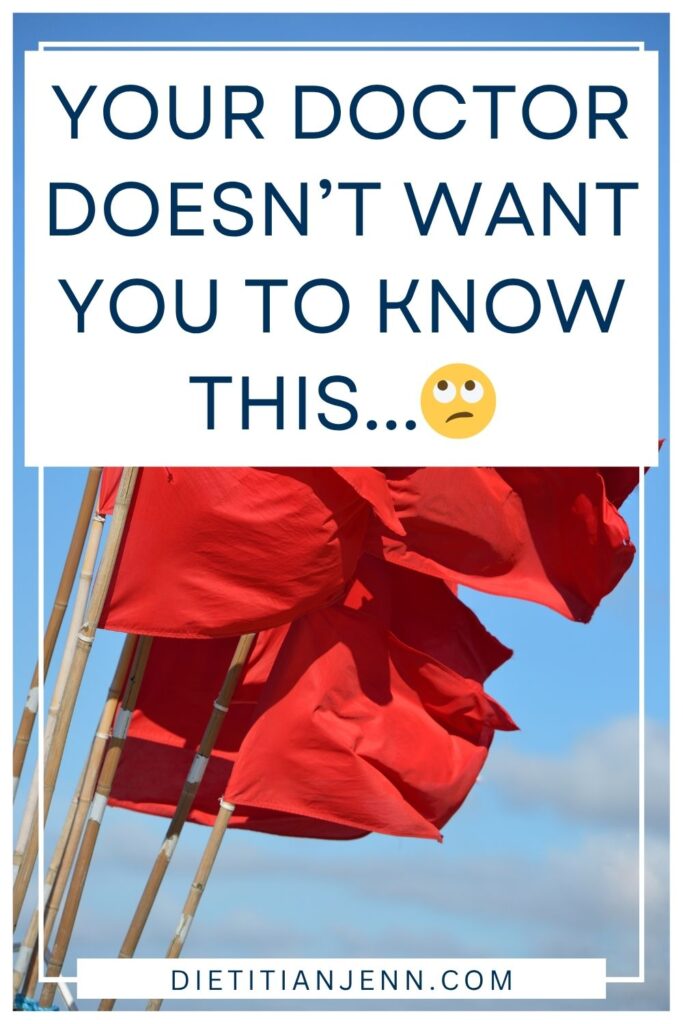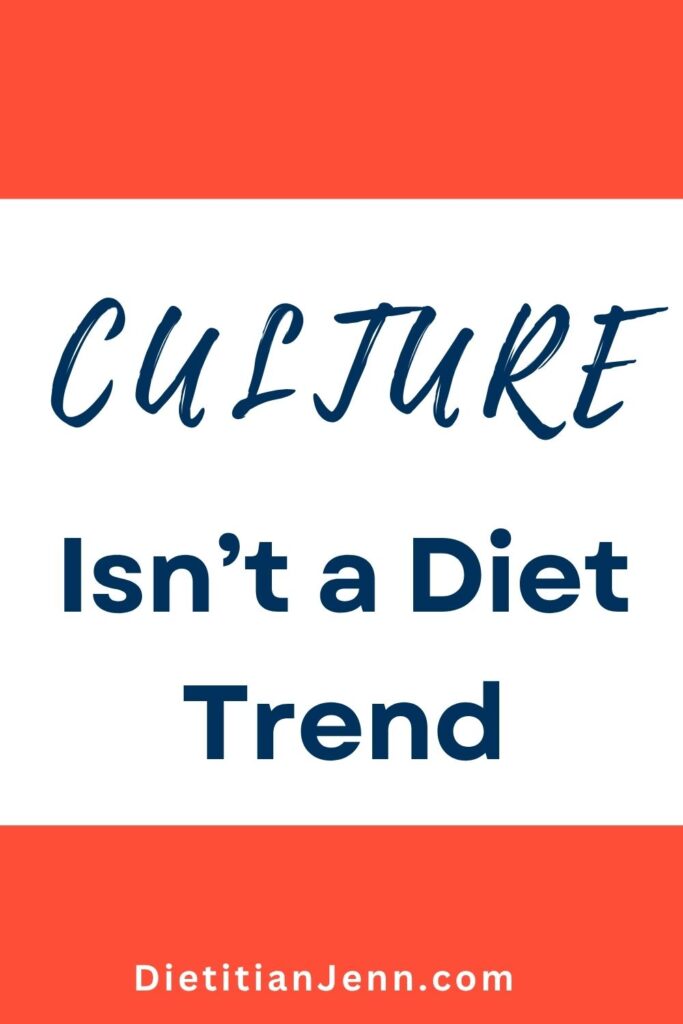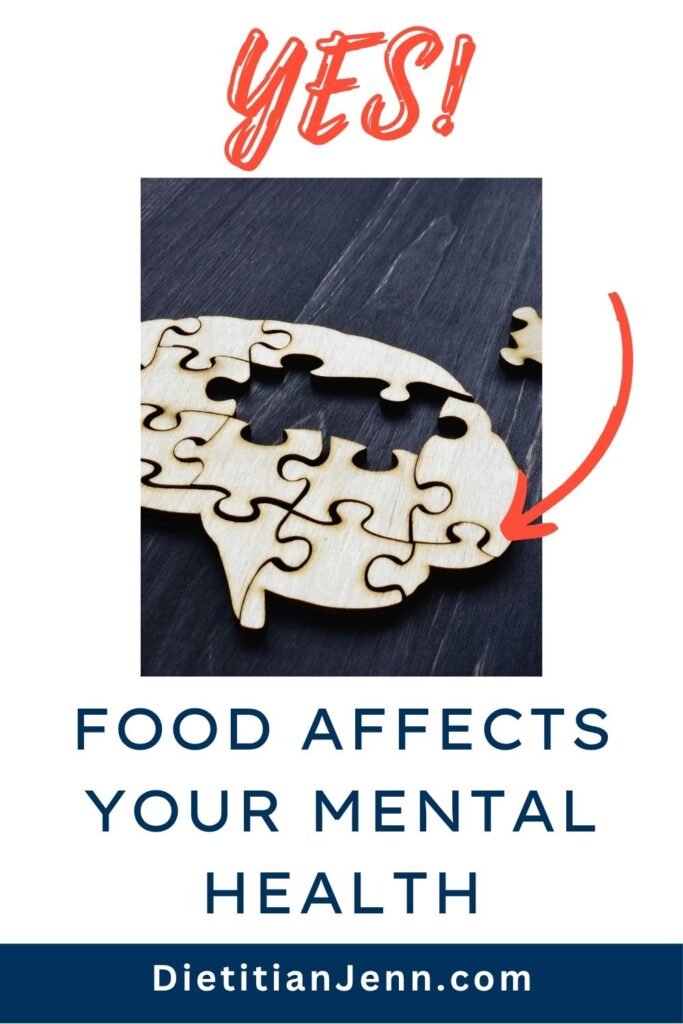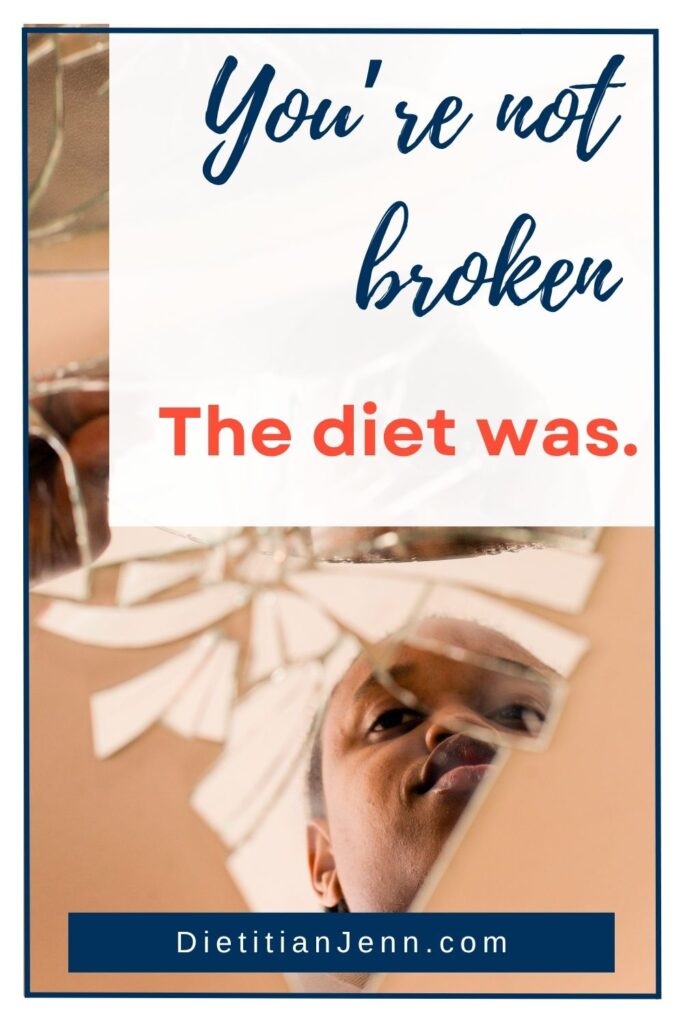Table of Contents
This post includes discussion of weight loss, dieting, food policing, and diet culture. Discussing the content, intent, and restriction of fad diets is an important topic, but can trigger eating disorder thoughts and/or behavior.
If you’re in recovery from disordered eating or feeling vulnerable to triggering content, please skip this one or come back when you’re in a more grounded place.
Everywhere you turn, someone’s trying to sell you a smaller body.
We live in a world where diet trends are everywhere; on your feed, in your group texts, even at the doctor’s office. But not all nutrition advice is created equal. Some of it is just flat-out harmful, and designed to make you feel broken.
TV commercials, TikTok influencers, even that friend from high school who suddenly “found the secret.” We’re constantly being told that thinner is better, and that weight loss is the answer to just about everything.
It’s not hard to see why so many people feel desperate for change.
The problem is, most of what’s being sold isn’t real change. It’s a restriction, repackaged in fancy branding with a fake promise of health. And while these fad diets may seem harmless or even helpful at first, they often come with serious consequences.
Some are ineffective. Most are expensive. And some are downright dangerous.
In this post, I’ll walk you through how to spot a fad diet before it hijacks your energy, your wallet, or your mental health. We’ll look at the red flags, the harm they can cause, and what to do instead.
Because your health is too important to be left in the hands of marketing gimmicks.
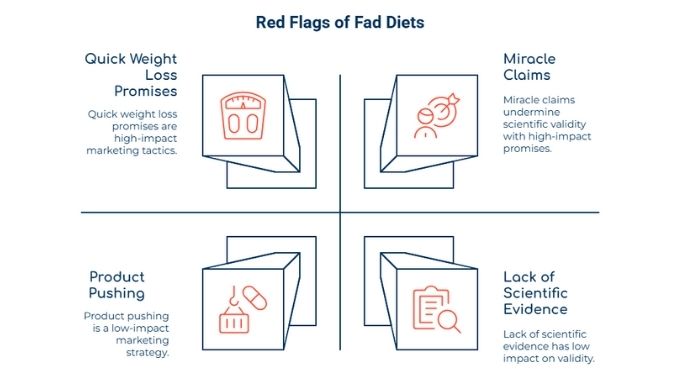
💡 Why Fad Diets Are So Tempting (And So Common)
Let’s just name it: the appeal of fad diets makes total sense.
We live in a culture that constantly tells us smaller is better. Thin bodies are praised in movies, advertising, and influencer “What I Eat in a Day” reels. Larger bodies? They’re often reduced to a punchline, a cautionary tale, or erased entirely.
That message isn’t just harmful—it’s exhausting.
So, when someone comes along claiming they’ve cracked the code? That they can help you shed pounds fast, feel energized, and finally fit the version of yourself you’ve been told you should be? It’s incredibly compelling.
Especially when it’s dressed up in “science-y” language.
Most fad diets don’t show up saying, “Hey! I’m the next version of the cabbage soup diet!” They talk about hormones, inflammation, detox pathways, or your body’s supposed inability to process carbs. They reference “emerging research,” but rarely provide actual studies. Or if they do, the findings are distorted beyond recognition.
And even if your brain’s saying, “This sounds fishy,” your heart might be saying, “But what if it works this time?”
Because these diets don’t just sell weight loss. They sell hope. They sell control. They sell a sense of certainty in a world where bodies, health, and food can feel so confusing.
And I get it. I’ve worked with so many people who genuinely wanted to feel better. Who followed the rules exactly. Only to end up more discouraged, more confused, and more disconnected from their bodies than ever before.
And once you know what to look for, you’ll start to spot them everywhere.
Dietitian’s Tip:
It’s not a personal failure if you’ve tried one (or ten). These diets are engineered to hook you, and then blame you when they don’t work.
The Red Flags of a Fad Diet
Fad diets are surprisingly easy to spot once you know what to look for.
They usually follow a predictable script, filled with confident promises, exaggerated claims, and a subtle (or not-so-subtle) suggestion that your body needs fixing. You’ll often hear the same catchphrases repeated across influencers, books, and brands:
- “Your doctor doesn’t want you to know…”
- “This one breakthrough will change everything…”
- “You’ve been lied to your whole life.”
- “Only I truly understand how the body works.”
This isn’t cutting-edge nutrition advice. It’s marketing. And it works because it taps into fear, shame, and the desire for quick solutions.
Let’s walk through the most common red flags so you can start spotting fad diets from a mile away.
🧪 It Promises a “Miracle” or Claims Exclusive Knowledge
If the person selling a diet sounds more like a conspiracy theorist than a healthcare professional, be skeptical.
Phrases like “doctors don’t want you to know,” or “they’ve been keeping this secret from you” aren’t just dramatic, they’re manipulative. The goal is to convince you that everyone else got it wrong and only this person has the truth. That kind of exclusivity isn’t empowering.
It’s isolating, and designed to make you dependent on them for answers (and products).
Or consider the last “miracle” product you saw on Facebook. You tried it…and suddenly your hormones are harmonized, your metabolism is recalibrated, and your gut is in some kind of ‘synergy cycle’ that no actual biologist has ever heard of.
Right?
Dietitian’s Tip:
If someone claims to be the only one who knows the “real” way to eat, that’s not expertise. It’s ego wrapped in sales copy.
⚡️ It Promises Quick, Dramatic Weight Loss
This is usually the loudest promise: “Drop 10 pounds in a week!” “Shrink your belly in 3 days!”
Here’s what they don’t mention: Fast weight loss isn’t fat loss. It’s mostly water, glycogen (your stored energy), and—worst of all—muscle.
And when the weight inevitably returns (because it always does), these plans are designed to make you feel like you failed. Not them. Not the plan. You.
That’s not just ineffective. It’s emotionally abusive.
🚫 It Demonizes Entire Food Groups
Some diets make this obvious. No carbs, no fat, no fruit.
Others do it sneakily, under the guise of “clean eating,” “anti-inflammatory” protocols, or fear-mongering around so-called “toxic” foods.
Let’s be clear: food isn’t poison.
Avoiding nightshades because Tom Brady does? You’re cutting out culturally significant, nutrient-rich foods like tomatoes, peppers, and eggplant.
Steering clear of lectins because of Steven Gundry? That means skipping beans, lentils, and peanuts. All affordable, fiber-and-protein-packed, gut-loving staples
Dietitian’s Tip:
When your food list starts shrinking, your nutrient intake (and your joy) usually follow.
Side note: Did you go vegetarian because someone told you it was healthier or w
💊 It Pushes Products, Supplements, or a “System”
All you have to do is follow their 30-day ‘Fat Oxidation Reset’—just $297 and one teaspoon of powder 3x daily!
If a diet ends in a product pitch, it was never about your health.
Books, powders, monthly shake subscriptions, and overpriced detox kits: none of these are necessary for a balanced, nourishing diet. But they’re highly profitable.
Look out for language like “specially formulated,” “proprietary blend,” or “you must use this supplement to see results.”
More importantly, supplements are not regulated by the FDA in the same way medications are. This means those pills you’re buying could not only be poorly researched for safety and efficacy, but could also contain literally anything. Anyone remember ephedra?
📉 It Lacks Real Scientific Evidence
YouTube is not peer-reviewed.
Anecdotes aren’t data. And “emerging research” that no one can link to? That’s not science.
Credible nutrition information should come from studies done on humans, published in peer-reviewed journals, and interpreted in the context of the broader evidence, not cherry-picked to support a pre-written narrative. Testimonials and before/after photos don’t count.
“Trust me” is not a credible source.
✨ It Claims to Be a Cure-All
Any diet that promises to heal your gut, fix your hormones, flatten your belly, give you all the energy, cure diabetes and autoimmune diseases, and boost your brainpower all at once should raise alarms.
There is no superfood or supplement that can override the complexity of human health. And variety, not obsessive repetition, is what builds a balanced, resilient body.
Dietitian’s Tip:
Superfoods aren’t magic. Ordinary foods, eaten consistently, are where the magic really happens.
🔥 It Claims to Change Your Body Chemistry
This one’s tricky because it sounds science-y.
- “Optimize metabolic flexibility.”
- “Trigger fat-adaptive pathways.”
- “Activate thermogenic fat-burning mode using nutrient timing and hormonal recalibration.”
Sounds impressive, right? Like someone did a deep dive into biochemistry just for you.
But your body already knows how to switch fuel sources. You “burn fat” overnight while you sleep. You switch between glucose and fat depending on activity, time of day, and what you’ve eaten, without needing to “activate” anything.
And most “keto” diets? They don’t even get people into ketosis. They just make them feel sluggish, constipated, and cranky while believing they’re “biohacking” their metabolism.
If it sounds like sci-fi, it probably is.
Dietitian’s Tip:
If you don’t know what “endogenous detox amplification” means, don’t worry. Neither do they.
🧼 It Talks About “Detoxing” or “Cleansing”
Your liver and kidneys do a fantastic job of detoxing your body every single day. That’s quite literally their job.
If they weren’t working, you wouldn’t need a juice cleanse. You’d need a hospital.
Detoxes, teas, and cleanses are marketing ploys, not medical solutions. And many of them can actually make you feel worse, lightheaded, fatigued, or nutrient-deficient. And good luck moving away from the bathroom.
Dietitian’s Tip:
If someone says you need to “flush out toxins,” ask them to name the toxin(s). Spoiler: they won’t.
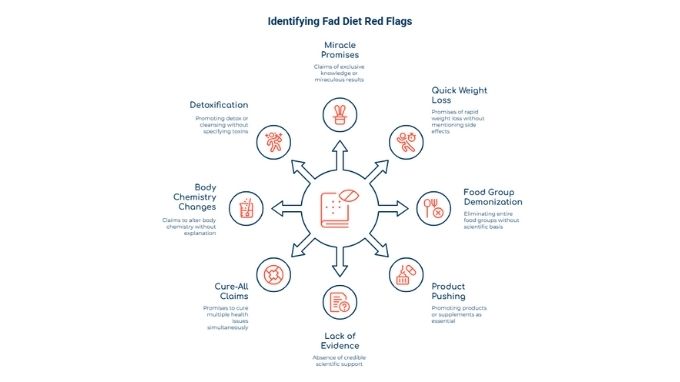
🧠 Why Fad Diets Are Harmful
So fad diet and nutrition claims aren’t true.
But you know what is? Nutritional deficiencies. Metabolic slowdown. Disordered eating. And a whole lot of stress, confusion, and guilt around food.
Fad diets might seem like a harmless way to “jumpstart” your health. But the harm is rarely visible right away. It shows up gradually—sometimes in your energy levels, sometimes in your labs, sometimes in your mindset around food and your body.
Here’s what’s actually happening when you’re following one of these plans:
🥦 Nutrient Deficiencies
Nutritional deficiencies can sneak up on you, even if a diet sounds healthy on the surface.
You don’t have to intentionally cut nutrients to end up lacking them. Often, when you focus too heavily on a specific type of food, or cut out a whole category, you naturally crowd out other essential nutrients. You may not even realize it’s happening until your energy crashes, your hair’s thinning, or you start wondering why you’re so moody and tired all the time.
Take the “negative calorie” myth, for example. This idea claims that certain foods (like celery or cucumber) require more energy to digest than they actually provide. So people start loading up on raw veggies in massive amounts, thinking they’re “eating clean” or tricking their metabolism into weight loss.
There’s nothing wrong with these foods; celery’s great!
But if you’re eating them in place of full meals or as your main source of food, you’re not just missing calories. You’re missing protein, fat, iron, zinc, B vitamins, and more. Add in the potential for bloating, gas, and GI distress from all that sudden fiber, and it becomes clear: “clean eating” isn’t always as clean as it sounds.
Low-fat diets, especially those from the 80s and early 90s, often led to similar issues. Fat is essential. Not just for hormones and energy, but also for absorbing fat-soluble vitamins like A, D, E, and K.
Ironically, some ultra-low-fat diets end up pushing people toward high-sugar, low-nutrient foods because fat was demonized without a plan to replace it with actual nourishment.
On the flip side, low-carb diets often lack fiber, which isn’t just crucial for digestion. Carbs play a role in heart health, blood sugar balance, and feeding your gut microbiome. These diets also tend to fall short on vitamin C, potassium, and beneficial plant compounds (phytochemicals) that help reduce inflammation and support immune function.
Dietitian’s Tip:
The more restrictive the diet, the more likely you are to be missing out on something important. And unfortunately, the body doesn’t run on good intentions and willpower alone. It needs fuel and variety.
⚠️ Increased Risk of Disordered Eating
Dieting is one of the strongest predictors of the development of an eating disorder. That’s not an exaggeration. And it’s not about vanity.
Eating disorders are serious, complex mental health conditions, and are biological, psychological, and often trauma-related. Anorexia nervosa is considered the deadliest of all psychiatric illnesses, and other forms of disordered eating can be just as damaging, both physically and emotionally.
And the impact is not limited to young girls.
I’ve worked with clients across all ages, genders, races, and body sizes who found themselves stuck in cycles of guilt, fear, and restriction, many starting from a place of “just wanting to be healthier.”
Because no one starts a diet expecting to develop an eating disorder.
It usually begins with good intentions: wanting to feel better, gain confidence, or take control of your health. Then you start to internalize the idea that the “ideal” body (the one you see in ads, fitness posts, or before-and-after reels) is the real measure of your worth.
Next comes the progressive restrictions. First it’s sugar. Then gluten. Then “processed foods.” Then dairy. Then carbs. And before long, the rules start piling up until food becomes something to manage, not enjoy. A stressor instead of a source of nourishment.
And the most frustrating part? This spiral is often praised. Restriction, perfectionism, and hyper-focus on “clean” eating can be masked as dedication and willpower. That kind of feedback only makes it harder to recognize when something has gone too far.
Dietitian’s Tip:
If you’re constantly thinking about food, avoiding social events, or feeling anxious around meals. You don’t need more willpower. You need compassion. And support.
You know that friend that spends hours in the kitchen, then takes all of it to work or to the neighbors without eating any of it? Check on them. They may not be okay.
Metabolic Disruption
Even if a fad diet doesn’t lead to disordered eating, it can still mess with your metabolism in a big way.
You might’ve heard people talk about “starvation mode,” usually in a vague or dramatic way that makes it sound like your body’s holding onto every crumb out of spite. That’s not quite how it works. But the real concept behind it? It’s called adaptive thermogenesis, and it’s very real.
When you consistently eat too little, whether it’s calories, protein, or certain micronutrients, your body goes into conservation mode. It slows down your energy expenditure to keep you alive on fewer resources.
That means your metabolism decreases, even though your body still needs to do all the same things: keep your heart beating, your brain thinking, your hormones functioning, and more.
The result? You feel foggy, sluggish, tired, irritable, and maybe even wired-but-exhausted. You might struggle to concentrate. You might stop getting hunger cues, or feel hungry all the time. Your workouts might feel harder, and your sleep might be worse.
And here’s the kicker: this metabolic slowdown is your body protecting you. It’s a built-in survival mechanism. But when you’re on a diet that’s telling you to “push through” the fatigue and ignore your hunger? It feels like failure.
It’s not failure. It’s biology.
The good news? Your metabolism isn’t broken forever. But healing it often requires time, consistency, and support from someone who can help you rebuild, without diving back into restrictions.
😩 Negative Impact on Mental Health
This is a huge topic. And one that deserves a lot more attention, but for now, let’s just touch the surface.
Your brain isn’t separate from your body. It runs on nutrients just like everything else.
You need adequate protein, carbs, and a variety of vitamins and minerals to create the neurotransmitters that regulate your mood and behavior.
Serotonin, dopamine, and melatonin aren’t just buzzwords; they’re essential chemical messengers, and they require raw materials like amino acids, B vitamins, and complex carbohydrates to be produced.
When your diet is too restrictive, whether it’s cutting calories, cutting carbs, or following endless food rules, your body will prioritize survival. That means digestion, mood, and hormone balance often get deprioritized in favor of more immediate needs like heartbeat and breath.
A good mood isn’t essential for survival. But that doesn’t mean it isn’t important.
Some of the biggest players in mental health from a nutrition standpoint include magnesium, zinc, iron, and the B vitamins. When those are deficient, often because variety is low or portions are too small, your mental health can take a hit. Even mild deficiencies can increase symptoms of fatigue, brain fog, anxiety, or low motivation.
And then there’s the gut-brain connection. When you restrict foods, you negatively impact your gut microbiome. A less diverse diet leads to a less diverse gut, and a less diverse gut has been linked to higher levels of anxiety, depression, and overall emotional distress and mental resilience.
Many people can even trace the onset of mood symptoms to things like food poisoning or antibiotic use, both of which drastically disrupt the microbiome. Now imagine doing something similar every day, through diet alone.
And let’s not forget blood sugar. Low blood sugar (a common result of skipping meals, overexercising, or under-eating) can mimic panic attacks. Rapid heart rate, sweating, shakiness, dizziness, a sense of doom. Sound familiar?
💸 Financial Strain
Even if a fad diet doesn’t come with a subscription box, supplement bundle, or influencer-endorsed protein powder, it can still strain your budget in ways that add up fast.
One of the first things people often do when starting a new diet? Throw away food. Perfectly fine, already-purchased food, because it’s suddenly not “clean” or compliant with the new plan. Then they go out and buy all-new groceries that align with the diet’s rules. That’s double the grocery bill, and we all know buying groceries once is expensive enough these days.
And it doesn’t stop there.
Many fad diets promote specialty or elitist food items. Think obscure superfoods, niche flours, fancy oils, or hyper-specific “approved” brands. Some require you to buy organic everything, grass-fed everything, or gluten-free everything, whether or not that’s actually necessary for your health.
These products are usually more expensive, less accessible, and harder to find, especially if you’re shopping on a budget or don’t live near a specialty store.
It’s not just about cost. It’s about time, access, and stress.
If you’re driving to three different stores to track down “hormone-free Himalayan yak milk kefir” (or whatever the latest detox “mastermind” is pushing), that’s not health. It’s hustle culture in a lab coat.
Dietitian’s Tip:
Nutrition advice should never be limited to people with the time, money, and privilege to overhaul their fridge every Monday.
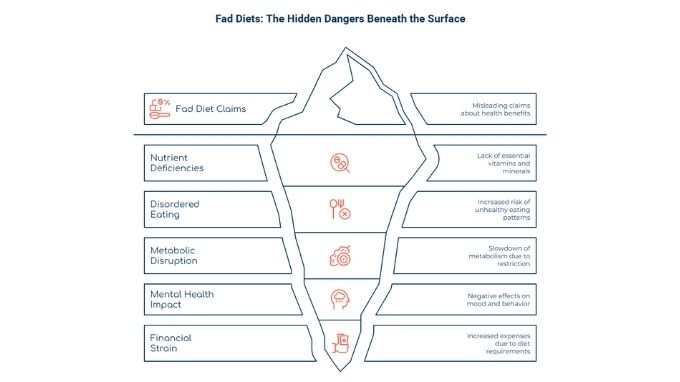
🔍 Real-Life Examples of Fad Diets
There are so many predatory, restrictive, and just plain bizarre diets out there that I could never list them all. And if I tried, it’d be outdated by the time I hit publish.
Fad diets range from slightly off-the-rails to full-on dangerous. Some have been around for decades; others pop up on TikTok overnight. Some sound like real nutrition advice until you dig deeper. Some are just… wild.
If something worked for you and you felt great, cool. But that doesn’t make it safe or sustainable for everyone.
The real question isn’t “Did I lose weight?” It’s “Was this approach nourishing, flexible, and sustainable, or was I just surviving it?” What is your overall definition of “success?”
Below are some of the most common (or notorious) ones I’ve come across, along with a few that might surprise you.
🥩 Atkins
Atkins was probably the first major structured diet I remember seeing everywhere. I vaguely recall the low-fat craze of the 80s (Olestra, anyone?), but Atkins in the 90s was a full-on cultural moment.
Originally written in the 70s, this low-carb, high-protein plan surged back with promises of effortless weight loss, mostly by cutting carbs to nearly nothing.
And people were grouchy. Turns out, there’s a reason for that. Carbs help produce feel-good brain chemicals like serotonin. When they disappeared from everyone’s plates, so did their good moods.
Atkins included an induction and maintenance phase, but let’s be real. Most people stayed in the super-restrictive early stage. This led to diets high in saturated fat and low in fiber, increasing the risk of high cholesterol and colon cancer.
While a modified Atkins diet can sometimes help adults with epilepsy, it doesn’t rank high on health otherwise.
🥬 The Cabbage Soup Diet
Exactly what it sounds like: cabbage soup, all day, every day. For seven days. Soul-sucking is the only accurate word for it.
You’re allowed different foods each day (in addition to your soup), but the rules are… strange. Day one? All fruits except bananas. Day four? Just bananas and skim milk. Sure.
No protein, no balance, no satisfaction. Any weight loss is water and muscle, and it comes roaring back once you start eating real meals again. Meanwhile, you’re depleted, tired, cranky, and probably low on several key nutrients by day three.
🧈 Keto
Keto has been a nightmare to watch unfold. I have never seen so many immediate and severe health issues tied to a single “mainstream” diet.
The original ketogenic diet was a medically supervised, therapeutic approach for epilepsy, not something created for weight loss. It mimics starvation by shifting your body into ketosis, where fat is burned for energy because carbs are unavailable. That process is fine, under medical supervision and for a medical reason.
But most people following keto now? They’re not actually in ketosis. They’re just eating bacon-wrapped cheese sticks and wondering why they feel terrible.
Keto has been linked to increased risk of heart disease, colon cancer, mental health issues, and fatty liver that can progress to liver disease. Hard pass.
My favorite defense of a keto diet lately has been people acting like they know something proudly (and incorrectly) stating that the reason people don’t do well on a keto diet is because we “think” it’s a high-fat diet, “but it’s really not.”
I’d make bank if someone paid me every time I saw an “expert” (the last was a travel agent) “school” a dietitian on how the keto diet is fantastic and not actually a high-fat diet when done right…
It’s literally a high-fat diet. High-fat, moderate-protein, near 0 carbs.
Oh, and you’re “burning” fat because that’s what you’re eating, not because you’ve unlocked some higher level metabolic “mode.
🦴 Paleo
The idea behind Paleo is that we should eat like our Paleolithic ancestors because “that’s how we evolved.” But there are a few glaring issues with this:
- Our Paleolithic ancestors lived to about 35, so maybe not the model of longevity.
- Archaeology shows they did eat many of the things Paleo tells us to avoid.
That said, the plan itself isn’t the worst. It emphasizes fruits, veggies, eggs, nuts, seeds, and lean meat—great! But it also excludes legumes, whole grains, and starchy vegetables with no evidence to back that up.
It’s lower in carbs than I’d recommend for many, but not absurd. Still, it’s expensive, restrictive, and full of unnecessary rules that can mess with your relationship with food over time.
🌾 Gluten-Free (When You Don’t Need It)
Going gluten-free when you don’t have a medical reason to? That’s a trend, not a health strategy.
Celiac disease, gluten intolerance, and wheat allergies are very real, and for those folks, gluten-free is non-negotiable. But for the general population, there’s no strong evidence that ditching gluten leads to better health. In fact, gluten-free versions of food often have more fat and salt, fewer nutrients, and taste like cardboard.
So they cost twice as much, and somehow still manage to make sandwiches sad.
Instead of eliminating gluten, try choosing whole grain options, and focus on the overall balance of your meals.
🍦 The Military Diet
A three-day cycle that repeats every week: toast, hot dogs, tuna, grapefruit, and vanilla ice cream. That’s it. The promise? Quick weight loss (of course), with the claim that it’s somehow tied to military science. (It’s not.)
It’s wildly low in calories, devoid of nutritional balance, and not even a little bit sustainable.
🪱 The Tapeworm Diet 😳
Yes, this one’s real. People have actually swallowed pills with tapeworm eggs in them, under the belief that the worm will “eat the extra calories” for them.
This has been around in some form since the Victorian era. And it can literally kill you.
Let’s not.
🥕 Raw Food Vegan Diet
The rule: nothing heated over 118°F. Sounds “natural,” but what it actually means is: no cooked grains, no legumes, no roasted veggies, no warm meals.
This diet is low in protein, fat, iron, and flavor. It’s also incredibly hard on your digestive system, especially if your gut isn’t used to handling that much raw fiber all at once.
There’s no magical enzyme advantage here. Just bloating, fatigue, and a very chilly relationship with your stove.
🍫 Optavia, SlimFast, Nutrisystem
Here’s the formula: buy our products, follow our rules, maybe eat some vegetables. That’s it.
These diets are designed to sell bars, shakes, and “fuelings” that are heavily processed, nutritionally questionable, and aggressively marketed. Real food becomes an occasional treat. That’s a red flag.
You deserve more than a glorified vending machine diet.
🥩 Carnivore Diet
All meat, all the time. No fruits, no veggies, no grains, no fiber. Some even go raw.
This diet might work for social media shock value, but it’s a disaster for actual human health. It’s extremely low in vitamins, minerals, fiber, and antioxidants, and high in saturated fat and risk. It’s also the fast track to constipation and scurvy.
Another hard pass.
🌱 Vegetarian or Vegan (When It’s Used as a Fad)
Let me be clear: a well-planned vegetarian or vegan diet can be incredibly health-promoting, sustainable, and ethical.
But when people adopt it as a trend without understanding how to meet their nutrient needs, it becomes another form of restriction. I’ve seen vegans avoid entire food groups (such as beans, including soy) for fear of “toxins” or “mucus-forming foods.” I’ve even had someone try to tell me milk is white because it’s full of pus. (No. Just no.)
Like any diet, the danger comes when it’s driven by fear, shame, or rigid food rules, not ethics or nourishment.
🌀 Other Diets Worth Mentioning
- South Beach, Whole30, Dukan, Zone, Carb Cycling – All variations on low-carb restriction, with different branding.
- Juice Cleanses & Detox Teas – Just avoid them. Your liver and kidneys already detox you.
- Master Cleanse – Lemon juice, cayenne, maple syrup, and misery.
- “Hormonal Reset” Plans – Usually pseudoscience wrapped in endocrinology lingo.
- Social media mashups – 1,200-calorie “what I eat in a day” posts with a collagen latte on the side.
🛑 How to Protect Yourself from Fad Diets
Once you’ve seen how damaging fad diets can be, it’s easy to feel frustrated or overwhelmed. But the goal here isn’t to shame anyone for falling for bad advice, it’s to give you tools to see it coming next time.
This section is about empowerment, not perfection. It’s about building a filter, so you can spot pseudoscience in the wild and choose what actually supports your health (without wrecking your relationship with food).
🧠 Use Critical Thinking. Especially When You’re Feeling Emotional
Marketing is built to trigger a reaction.
That gut-punch claim about “toxins in your belly,” or the “before and after” photo that suddenly makes you question your lunch? That’s not education, it’s emotional manipulation.
If a nutrition plan (or Instagram reel, or article, or post) gives you a visceral reaction. Whether it’s guilt, fear, or urgency—pause. Take a step back. Give yourself a little space, and revisit the message later when your nervous system has had a chance to settle.
This doesn’t just apply to diet advice. It’s a helpful tool for evaluating anything that makes a big claim, healthcare, policy, politics, you name it.
Dietitian’s Tip:
If there really was a perfect eating plan that worked for everyone, was totally sustainable, and fixed everything it promised? We’d all be on it. But that’s not how bodies work.
📚 Seek Credible, Evidence-Based Information
If you’re curious about a diet and don’t have a dietitian to text (hi, by the way 👋), start with the source.
Look for information from:
- Government or educational sites (.gov or .edu) – Note: 2025 is seeing some huge political and policy shifts that are NOT evidenced-based. Some resources are being wiped and some that remain are headed by decidedely (and deterimently) anti-science and anti-health proponents of fad and dangerous health and nutrition claims. At the time of this update (July 2025) pubmed.gov has been unbothered. Likely because these people don’t know what that is….
- Reputable science-based media outlets like Healthline or U.S. News & World Report
- Registered dietitians and credentialed professionals (not just people with “nutrition” in their bio)
- PubMed, if you want to look at peer-reviewed research directly
Avoid relying on influencers who cite their own transformation as proof. Anecdotes are powerful, but they’re not evidence. Especially when they’re selling something.
💬 Work With a Registered Dietitian
I’m obviously a little biased here, but for good reason.
Registered dietitians are trained to interpret research, understand the nuances of health conditions, and help you find a nutrition approach that works for your body and your real life. No other healthcare professional has the same depth of nutrition education. And I’d never try to do their job, either.
We also get asked about every fad diet under the sun. If we haven’t researched the one you’re wondering about yet, we can. Preferably, you’ll talk to someone who knows your medical history and can help you cut through the noise.
And no, we don’t all want to put you on a meal plan and take away your cookies. Nor will we flash you an image of the old-school food pyramid and call it a day.
🍩 Avoid Diets That Cut Out the Foods You Love
If a diet plan tells you that you can’t have your favorite foods, full stop. It’s not built to last.
Sustainability isn’t just about nutrients. It’s about enjoyment. If your nutrition plan doesn’t leave space for food that brings you joy (birthday cake, ramen on a cold night, your grandma’s cornbread) it’s going to backfire. Probably sooner rather than later.
And if it cuts out whole food groups (like carbs or fats), your body will respond by getting louder: cravings, hanger, obsessive thoughts about food. That’s not lack of discipline. That’s biology doing its job.
👥 Don’t Fall for One-Size-Fits-All Plans
If a diet treats everyone the same, it’s not worth your time.
Your needs depend on your age, health conditions, activity level, food access, schedule, and culture. Not to mention your preferences, values, stress level, and abilities.. Any plan that doesn’t leave room for that nuance isn’t about health. It’s about control.
You deserve better than a spreadsheet diet created by someone who’s never met you.
🧭 What to Do Instead
Once you see just how many diets are built on restriction, shame, and smoke-and-mirrors science, it’s easy to feel discouraged. But nutrition doesn’t have to be complicated, punitive, or based on fear.
There’s another way. And it’s a whole lot more sustainable.
Start with the basics: balance, variety, and flexibility. That’s it.
Forget the rigid rules and black-and-white thinking. Instead of focusing on what to cut out, focus on what to add in. Colorful produce, plant proteins, whole grains, and healthy fats can all have a place on your plate, alongside your favorite comfort foods.
And unless you have a medical reason to avoid something (like celiac disease or a true allergy), all food groups can fit. Carbs aren’t the enemy. Fats aren’t a threat. Sugar isn’t toxic. Food is food, and your body knows what to do with it.
This isn’t about following a strict plan. It’s about building habits that support your energy, focus, digestion, mood, and long-term well-being, without making food the center of your life.
You don’t have to eat “clean” to be healthy. You don’t have to track everything to be intentional. You don’t have to earn your meals or burn them off.
You just have to feed yourself. Consistently. Kindly. Without fear.
Dietitian’s Tip:
A nourishing diet isn’t perfect. It’s flexible. It adapts when life changes. And it leaves room for real joy.
🧾 You’re Not the Problem. The Diet Is
If you’ve ever felt like a failure for not sticking to a diet…
If you’ve ever blamed yourself for regaining weight…
If you’ve ever wondered why something that was supposed to make you “healthier” made you feel worse…
It wasn’t you. It was the diet.
Dietitian’s Tip:
If it makes you anxious to eat a banana, the problem isn’t the banana. It’s the wellness culture that taught you to fear your food.
Fad diets are built to be seductive. They make big promises, exploit your insecurities, and offer just enough hope to keep you hooked. But behind the clever marketing? There’s restriction, misinformation, and a whole lot of harm.
They’re not designed for sustainability. They’re designed to keep you coming back for more.
And when they inevitably stop working, or become too hard to follow, they blame you for not trying hard enough.
You’re not broken. You’re not lazy. And you’re not alone.
Real health doesn’t come from fear, control, or chasing someone else’s version of “perfect.” It comes from trust—trust in your body, your needs, and your ability to take care of yourself without shame.
So here’s what I want you to take away from this:
- Fad diets are often built on extreme rules, fear-based claims, and pseudoscience.
- They can lead to nutrient deficiencies, disordered eating patterns, metabolic issues, and emotional distress.
- You deserve better.
Look for balance. Look for variety. Look for a way of eating that supports your life, not one that takes it over. And if you’re not sure where to start, that’s okay. A dietitian can help you sort through the noise and figure out what works for you.
Your body doesn’t need to be fixed.
Your diet doesn’t need to be perfect.
And your worth has nothing to do with the size of your jeans or what’s on your plate.
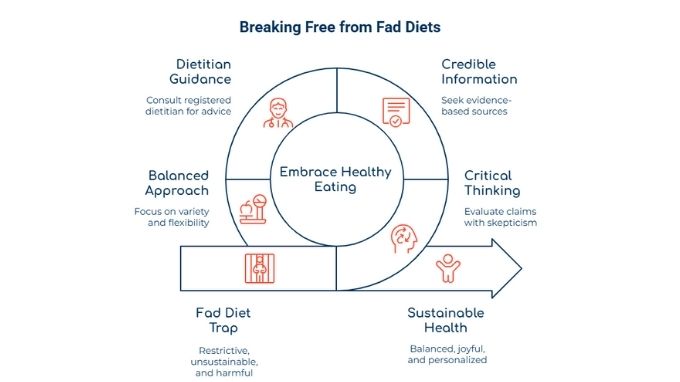
🌟 Ready to Step Away from the Noise?
If you’re tired of sorting through conflicting advice and just want a realistic way to eat well, without food rules or guilt, I’ve got you.
I work with real people (with real lives) to help them build flexible, sustainable eating habits that support their values, their health, and their sanity.
👉 Curious what that could look like for you? Check out my services or book a “Get It Together” call and let’s figure it out together. No judgment, no nonsense.
FAQs
There are so many! The 5 most common I hear about currently are:
1. Keto Diet
2. Carnivore Diet
3. Juice Cleanses
4. Optavia
5. Paleo
1. Think critically. Evaluate claims of miracles, knowledge no one else has, or assertations that go against the scientific consensus when you’re in a non-emotional state.
2. Look for a one size fits all approach. Protein, energy, and other needs all vary based on a ton of different factors. Anyone that spouts off the same number or uses the same calculation for everyone doesn’t know what they’re talking about.
*They aren’t sustainable, but when you can’t sustain them, you (or the creator) blame you.
* They can be very damaging to your metabolic health, generally causing muscle wasting.
* They can be very harmful to your mental health.
* Dieting is one of the major predictors of developing an eating disorder.
* They tend to cause deficiencies in various nutrients.
Our society values thinness over a lot of other factors. Look in the media. If people in larger bodies are represented, they are often portrayed as the funny friend, foolish, ignorant, or lazy, etc. People internalize that shit, judging both themselves and others based on the ridiculous stigma that thinness is associated with ALL THE GOOD.
So when someone comes along sounding authoritative and promising to make you thinner, it’s really hard not to get wrapped up in it. You believe this one will work because it HAS to work.
And they’re structured in a way that if you fail their fad diet, the problem is you, not the shitty diet, perpetuating the absurd idea that larger people have no self-control or are too foolish to stick to a plan.
What are you measuring here?
They’re successful at earning money for those peddling them. They’re successful in making you feel bad about yourself so you’re susceptible to their sales tactics. So for people in the diet industry, they are inexplicably successful.
For those that try the diets, they are not successful at weight management or at making you healthier or happier.
Jennifer Hanes MS, RDN, LD is a registered dietitian, mom, wife, and vegetarian in North Texas. She has dedicated Dietitian Jenn to be a source of information, ideas, and inspiration for people like her, vegetarians that live with people with different dietary beliefs and/or needs in a multivore household.
